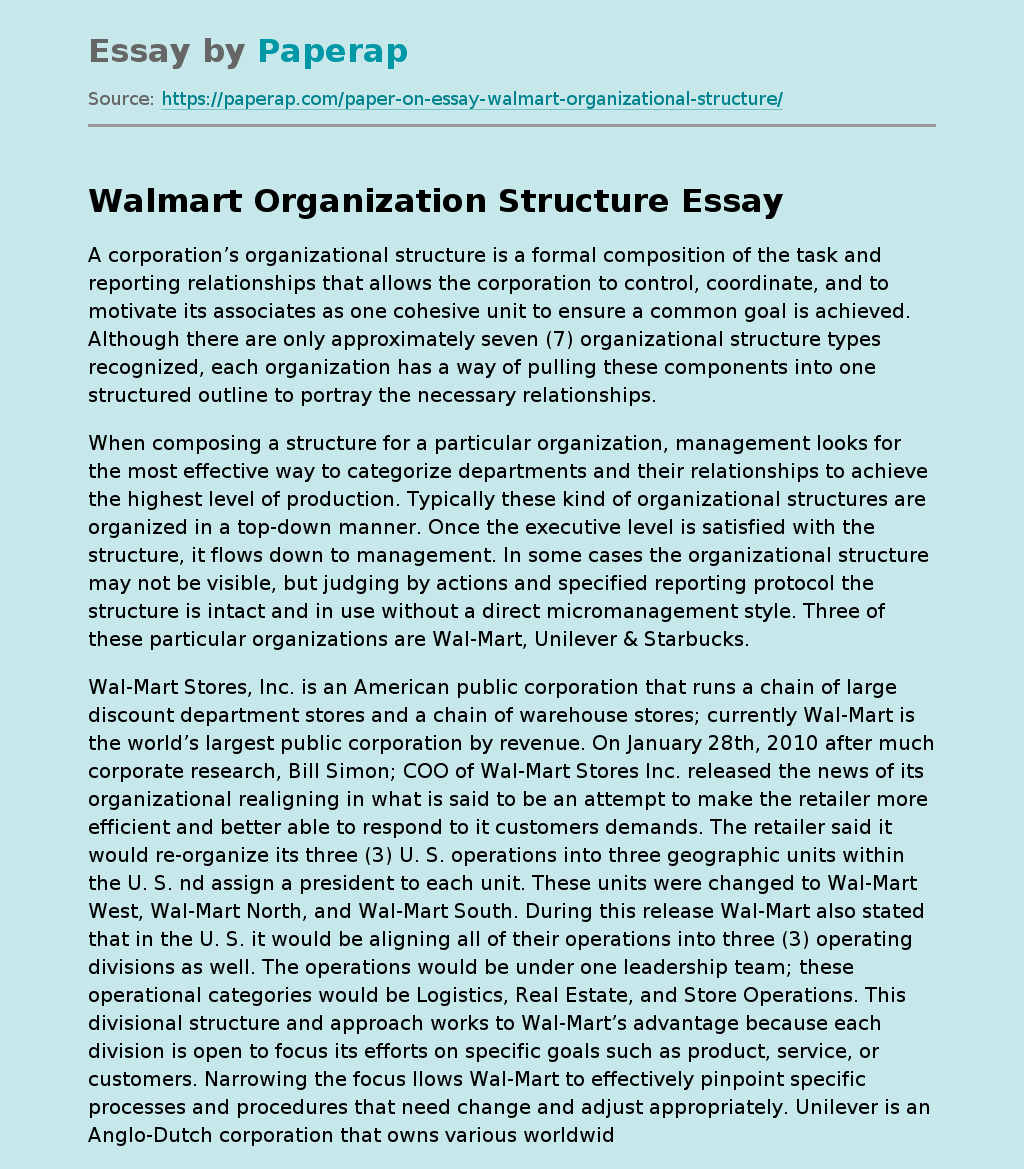Walmart Organization Structure
A corporation’s organizational structure is a formal composition of the task and reporting relationships that allows the corporation to control, coordinate, and to motivate its associates as one cohesive unit to ensure a common goal is achieved. Although there are only approximately seven (7) organizational structure types recognized, each organization has a way of pulling these components into one structured outline to portray the necessary relationships.
When composing a structure for a particular organization, management looks for the most effective way to categorize departments and their relationships to achieve the highest level of production.
Typically these kind of organizational structures are organized in a top-down manner. Once the executive level is satisfied with the structure, it flows down to management. In some cases the organizational structure may not be visible, but judging by actions and specified reporting protocol the structure is intact and in use without a direct micromanagement style. Three of these particular organizations are Wal-Mart, Unilever & Starbucks.
Wal-Mart Stores, Inc. is an American public corporation that runs a chain of large discount department stores and a chain of warehouse stores; currently Wal-Mart is the world’s largest public corporation by revenue. On January 28th, 2010 after much corporate research, Bill Simon; COO of Wal-Mart Stores Inc. released the news of its organizational realigning in what is said to be an attempt to make the retailer more efficient and better able to respond to it customers demands. The retailer said it would re-organize its three (3) U. S. operations into three geographic units within the U.
S. nd assign a president to each unit. These units were changed to Wal-Mart West, Wal-Mart North, and Wal-Mart South. During this release Wal-Mart also stated that in the U. S. it would be aligning all of their operations into three (3) operating divisions as well. The operations would be under one leadership team; these operational categories would be Logistics, Real Estate, and Store Operations. This divisional structure and approach works to Wal-Mart’s advantage because each division is open to focus its efforts on specific goals such as product, service, or customers. Narrowing the focus llows Wal-Mart to effectively pinpoint specific processes and procedures that need change and adjust appropriately. Unilever is an Anglo-Dutch corporation that owns various worldwide consumer products; food, beverage, cleaning agents, and personal care product brands. Unilever is a dual-listed organization made up of Unilever N. V. in Rotterdam, The Netherlands and Unilever PLC in London, United Kingdom. Both Unilever companies have the same directors and operate as a single business. Ultimately Unilever represents another common organizational structure similar to that of Wal-Mart and Starbucks but in a hybrid form.
What Type Of Organizational Structure Does Walmart Have
This organization operates with three (3) divisional regions, two (2) product segments, and five (5) functional segments. Unilever developed this structure for their own company to process procedures, improve communication, and to take advantage of resources. Starbucks Corporation is an international coffee and coffeehouse chain based in Seattle, Washington. Currently they are the largest coffeehouse company in the worlds with currently over 17,800 stores throughout 49 countries; over 11,000 in the U. S. almost 800 in the UK, and nearly 1000 in Canada. On January 8, 2008 Starbucks Corporation appointed Howard Shultz as the new CEO. Not long after his newly appointed position in April of 2008, Shultz rearranged Starbucks organizational structure to better accommodate customer satisfaction. Shultz announced that this would be done with the expansion of their matrix organizational structure. Their organization would re-organize its four (4) U. S. operations into Western/Pacific, Northwest/Mountain, Southeast/Plains, and Northeast/Atlantic.
Howard Shultz believes Starbucks will be able to develop products specified to market appeal more rapidly after the appropriate adjustments have been made. Some of the major advantages to having this kind of organizational structure include maximized communication channels. The second (2) part of the Starbucks re-alignment structure is the continued support function of each location operating as their own department. By supporting the shared goals and visions of each location within the U. S. divisions working as one cohesive unit within the U. S. the growth impact would be financially focused and lucrative.
Walmart Organization Structure. (2019, Dec 05). Retrieved from https://paperap.com/paper-on-essay-walmart-organizational-structure/

